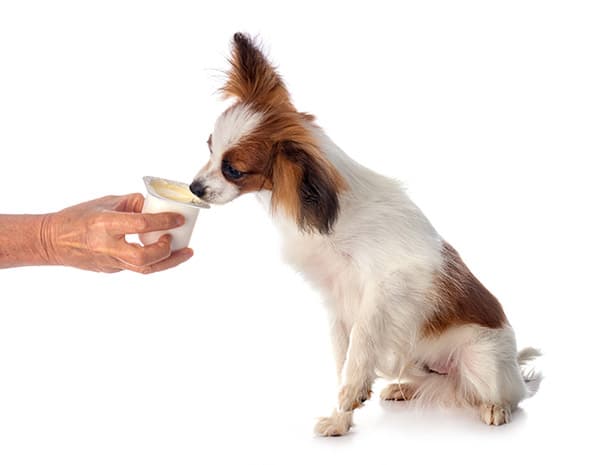You love your furry pal and want to give them awesome treats.
And when he’s sitting there giving you those puppy eyes while you’re eating something, it’s hard to resist sharing.
However, you know that not all human food is safe for him.
In fact, some items like chocolate are toxic.
That’s why it’s important to know when you need to ignore those hypnotizing stares.
Among other debatable foods, many dog owners wonder whether yogurt is safe for their lovable canines.
This article will discuss the safety concerns, benefits of giving your pup yogurt, what type to provide, and tips for adding it to their diet.
Is Yogurt Really Safe for Dogs?
As a general rule, yogurt is safe for dogs.
In fact, it can provide several benefits.
Yogurt is a good source of protein and calcium, but the benefits don’t stop there.
It also helps in the following ways:
It Can Help Digestion
Yogurt has probiotics, which are known to improve digestion and help with both constipation and diarrhea in humans.
Did you know that probiotics can do the same with dogs?
This is one reason yogurt is considered beneficial for canines.
However, if your dog is lactose intolerant or you give him yogurt with high amounts of dairy, it can cause more problems than it can help.
It Can Improve Immunity
Yogurt with live cultures is full of vitamins, antioxidants, and probiotics.
These are all helpful for strengthening the immune system, increasing resistance to infection, and helping in the recovery process.
It Can Help Control Cholesterol
Cholesterol can be as big of an issue in dogs as in humans.
Sadly, high cholesterol can lead to hemorrhaging, heart attacks, and problems in the circulatory system – all of which can lead to premature death in dogs.
Yogurt is a nice treat that can help lower canine cholesterol to prevent these potential problems.

Can My Dog Eat the Same Yogurt As Me?
While yogurt can be beneficial for dogs, that doesn’t necessarily mean it’s a good idea to let them lick your yogurt cup clean.
Some yogurt includes ingredients that are harmful to dogs, such as added sweeteners.
Any yogurt that has added sweeteners – either natural or artificial – is not good for dogs for the following reasons:
- Artificial sweeteners– Many artificial sweeteners are toxic to dogs. Xylitol is one of the worst, and it can cause liver failure and seizures. It has been known to be fatal to pups.
- Natural sweeteners– Even products with added natural sweeteners should be avoided. This is because the more sugar your pup takes in, the greater the chance he’ll suffer from diabetes, obesity, and related health conditions.
Unfortunately, most of the yogurt you fill your fridge with contains added sweetener.
Additionally, some dogs are lactose intolerant, making human yogurt a little riskier.
Some companies that produce dog food and treats add yogurt to their products.
These are typically safe as they are made with dogs in mind.
Your vet might recommend these over human yogurt.
If you decide to go with human yogurt, aim for plain, fat-free Greek yogurt.
It provides live probiotic cultures, two times the protein, and lower levels of lactose than other yogurts.
That means that it gives your pup the benefits without the full risk of dairy-related issues.
Some examples of good choices include the following:
- Chobani Non-Fat Greek Yogurt
- Happy Belly Greek Yogurt
- Seven Stars Organic Yogurt
- 365 Organic Greek Yogurt
Seven Stars Yogurt is not Greek yogurt.
However, its organic content makes it a great substitution if you are unable to find a Greek option on your grocery aisle.
5 Tips for Feeding Your Dog Yogurt
If you like the idea of giving your furry buddy yogurt, these five tips can help ensure success with the process.
1. Talk to Your Vet First
Though Greek yogurt is typically considered safe for dogs, it’s always wise to check with your vet before giving your pup any new food.
Your vet can let you know if your fur baby has any issues that yogurt can exacerbate.
They can also give you tips for feeding it to them and help you keep an eye on any potential side effects.
2. Read the Ingredients
When choosing a yogurt, it’s important that you read the label.
Be sure that there are no added sweeteners and no other ingredients that you know your dog is allergic to.
Vets can come in particularly handy here, as they can see signs of allergies during routine exams.
If you consult your vet before starting your dog on yogurt, they can make you aware of any potential allergies they have spotted.
3. Add It to Your Pup’s Food
Once you’ve got your vet’s approval and have read the label thoroughly, you can start feeding yogurt to your dog.
Keep in mind that dogs cannot have as much yogurt as humans can.
In fact, you should keep it down to no more than three teaspoons a day.
You can just let them lick the spoon if you want.
Or you can add it to their regular food as a topping.
4. Freeze It
Another idea is to freeze three teaspoons of yogurt in an ice tray or other freezable container.
You can then let your dog enjoy a cold, tasty treat on summer days.
They’ll love you even more for it.
5. Keep An Eye on Their Reaction
After you start feeding your doggy yogurt, you’ll need to keep an eye on them.
Although they should be fine with non-fat, plain Greek yogurt, you should never just assume that’s the case.
Watch for any reactions, such as diarrhea and vomiting.
If you notice anything negative, be sure to talk to your vet.
They might tell you to lower the amount you give, change to a different brand, or even stop giving it to them.
